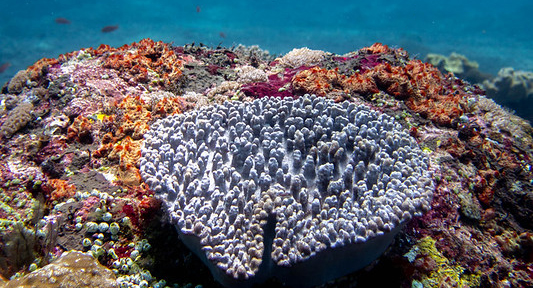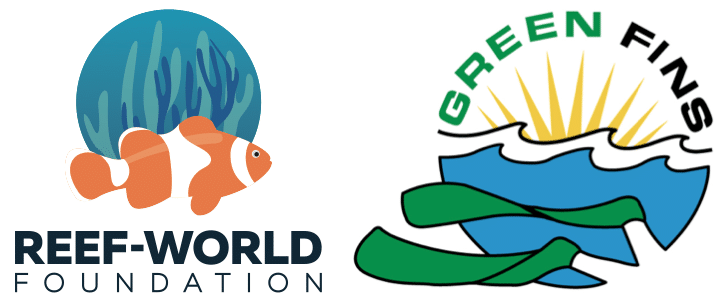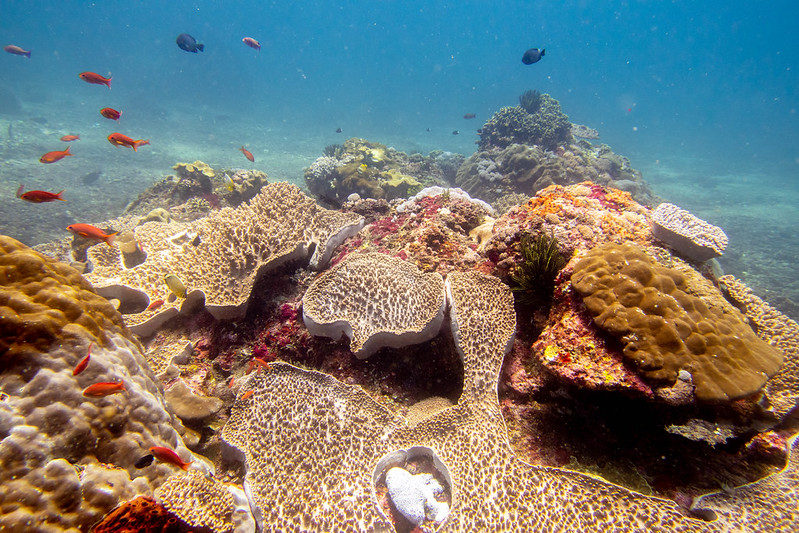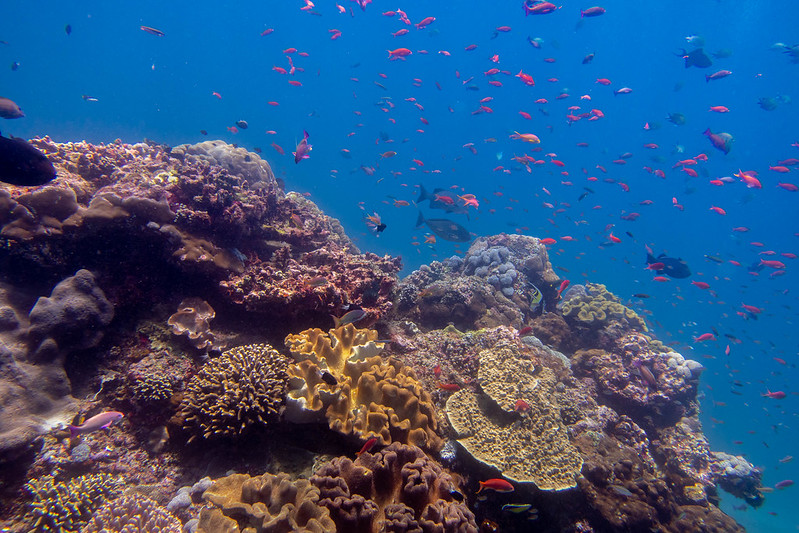Marine Life & Conservation
Join The Reef-World Foundation and The Ocean Agency at World Environment Day Webinar

 Time for coral: how YOU can help save an entire ecosystem
Time for coral: how YOU can help save an entire ecosystem
Discover the simple changes you can make to protect coral reefs for future generations.
Coral reefs – often described as the “rainforests of the sea” – are some of the most astoundingly biodiverse ecosystems in the world. They support a quarter of all marine species, protect our coastlines, provide food and livelihoods for 500 million people and are even used in the development of new medicines. Yet, these exceptional animals (that’s right, coral is an animal!) are under threat.
This World Environment Day join the United Nations Environment Programme, The Ocean Agency and The Reef-World Foundation for a fascinating discussion about these vital ecosystems. You’ll learn:
- Why is coral so important?
- What threats does this ecosystem face?
- How a ground-breaking Netflix Originals documentary has put corals in the global spotlight
- How the Green Fins initiative is conserving coral reefs around the world
- The simple changes YOU can make to protect coral reefs for future generations.
The webinar will be available on World Environment Day – 5th June – at: https://reef-world.org/blog/time-for-coral
About the panel
Gabriel Grimsditch, Programme Management Officer, United Nations Environment Programme
Gabriel Grimsditch is a Programme Management Officer and marine ecosystems expert with the United Nations Environment Programme based at the headquarters in Nairobi, Kenya. He has over 15 years’ experience working on the conservation, research and sustainable management of coastal ecosystems around the world, including with the International Union for the Conservation of Nature and with CORDIO East Africa. Gabriel currently leads UNEP’s work on coral reefs, mangroves and seagrass.
Richard Vevers, Founder & CEO, The Ocean Agency
Richard Vevers is the founder and CEO of The Ocean Agency, The Advertising Agency for the Ocean – a unique nonprofit accelerating ocean conservation action through creativity, technology and powerful partnerships. Before diving into ocean and coral reef conservation, Vevers first worked at some of the top London advertising agencies and then as an artist and underwater photographer. It is this background that has guided his unique creative and business-thinking approach to ocean conservation. His ideas have included; inventing the SVII camera and taking Google Streetview Underwater, the Netflix Original Documentary Chasing Coral, and 50 Reefs – a targeted approach to saving coral reefs. His imagery, revealing what is happening to our oceans, is some of the most viewed underwater imagery of all time, and his ideas, project and public speaking have made him a leading voice in the fight to save coral reefs.
Chloë Harvey, Director, The Reef-World Foundation
Chloë Harvey is a professional diver and marine biologist with over 15 years’ experience working in tropical marine environments and supporting adoption of sustainable business models and practice within all segments of the diving industry. As Director of the UK Charity The Reef-World Foundation she has developed the Green Fins initiative for sustainable diving in partnership with the UN Environment Programme. She has worked with over 500 business owners and 19 national authorities to provide them with the tools and support needed to drive sustainable marine tourism practices.
James J Harvey, Director, The Reef-World Foundation
JJ Harvey is a marine biologist and diver with over 10 years’ experience working in tropical marine environments. This combined background provides a scientific and balanced approach to training, helping to educate those in a position to act and explain how and why it is important to reduce threats to marine ecosystems. JJ has worked closely with national governments, the private sector and international agencies to achieve successful outcomes that are meaningful to all stakeholders. As Director at Reef-World, JJ has led the development of Green Fins across eleven South East Asian, Middle Eastern, Pacific, and Caribbean countries since 2008 training national governments and NGO’s to manage the initiative. Today, Green Fins is a globally recognised approach for managing sustainable diving activities internationally with a proven conservation impact.
To care for ourselves we must care for coral. It’s time to wake up. To take action. To raise our voices. It’s time to make simple changes for a sustainable future.
It’s Time for Coral.
To find out more about The Reef-World Foundation visit their website by clicking here.
Marine Life & Conservation
Paul Watson Released as Denmark Blocks Japan’s Extradition Bid

Renowned anti-whaling activist Paul Watson has been released from custody in Greenland after spending five months in detention. Denmark’s Justice Ministry rejected Japan’s request for his extradition, citing insufficient guarantees that his time already served in custody would be credited against any potential sentence.
The 74-year-old Canadian-American was arrested on July 21 in Nuuk, Greenland’s capital, when his ship docked to refuel. His arrest was based on a 2012 Japanese warrant related to a 2010 encounter in Antarctic waters. Japan alleged Watson obstructed operations and caused damage to a whaling research ship during efforts to disrupt illegal whaling. Watson has consistently denied these claims, maintaining his commitment to marine conservation.
Denmark, which oversees extradition matters for Greenland, concluded that while the legal conditions for extradition were met, the lack of assurances from Japan regarding time-served credit made extradition untenable.
In a video shared by his foundation, Watson expressed gratitude and relief, saying, “After five months, it’s good to be out… and good to know they’re not sending me to Japan.” He added that the most difficult part of his time in custody was being separated from his two young sons.
Watson is a pioneering figure in marine conservation, known for founding the Captain Paul Watson Foundation in 2022 after decades of activism with the Sea Shepherd Conservation Society. His bold efforts to defend marine life have earned him widespread support, including from celebrities and conservationists. His work has also been featured in the acclaimed reality TV series Whale Wars.
Watson’s lawyer, Jonas Christoffersen, praised the decision, stating, “We are happy and relieved that Paul Watson is now free.” He added that Watson is eager to reunite with his family and continue his vital work.
The arrest occurred while Watson’s vessel, the M/Y John Paul DeJoria, was en route to the North Pacific with a team of 26 volunteers to intercept a Japanese whaling ship. His foundation described the arrest as politically motivated and emphasized that Watson’s actions were focused on ending illegal whaling practices.
Japan resumed commercial whaling in 2019 after leaving the International Whaling Commission, asserting that whale meat is a cultural tradition. Conservationists, however, continue to challenge these practices, highlighting their impact on marine ecosystems.
Despite the challenges, Watson remains steadfast in his mission to protect marine life and bring attention to whaling practices. His dedication to ocean conservation has made him a globally respected advocate for the environment.
Marine Life & Conservation
12 Days of Zero-Waste Fish-mas

This holiday period, the Marine Conservation Society, the UK’s leading ocean membership charity, invites you to make some simple changes to eating fish this Christmas to help our seas.
Dr Kenneth Bodles, Head of Fisheries and Aquaculture at the Marine Conservation Society, said, “During the festive season, our consumption increases, but so does waste. Sustainability isn’t just about where food comes from – it’s also about how you use it. By reducing waste and making the most out of your seafood, you’re not only taking steps to be more ocean-friendly, but can also help to cut costs during what is often one of the most expensive times of the year”.
The Marine Conservation Society has compiled twelve tips on how to consume seafood sustainably with zero-waste this Christmas:
Buy whole fish instead of fillets
Instead of fillets, consider buying whole fish such as salmon, hake, or lemon sole. By adopting a “nose to tail” approach with cooking, whole-baked fish not only feeds a crowd, but also helps to minimise waste and maximise sustainability by using up every part of the animal, including bones, skin, and fat.
Make fish stock
Leftover fish bones or shells can be put to good use by boiling them to make a nourishing fish stock or bisque. This can be frozen and preserved for later use and makes for a flavourful base in a soup.
Make your own fish pâté
Avoid waste by turning leftover fish, such as smoked mackerel or salmon, into a delicious pâté by blending with cream cheese and lemon. Perfect when paired with crackers.
The sustainability of salmon and mackerel varies depending on where and how it is caught or farmed. For more information on green-rated options, check the charity’s Good Fish Guide.
Buy frozen
By purchasing seafood that is frozen or vacuum-packed, this helps to reduce waste by extending the shelf life of your food.
Fish pie
If you’re wondering what to do with leftover cooked fish, why not opt for a classic fish pie with mashed potatoes, leeks, and a cheesy sauce? A sure crowd pleaser on Boxing Day.
Use the head
Don’t forget the fish head! The meat is incredibly tender and flavourful. The charity recommends a cod’s head curry or recreating Fallow’s renowned cod’s head in siracha butter.
By stretching your ingredients further, not only is this a more sustainable way to enjoy seafood, but also cost-effective by repurposing leftovers and cooking creatively.
Boxing Day brunch
Mix leftover kippers or smoked salmon with scrambled eggs for a tasty, zero-waste, Boxing Day brunch.
For best choice, make sure you buy kippers, or herring, from the North Sea and the North Irish Sea.
Zero-waste storage
A top tip from the Marine Conservation Society to avoid waste is freezing fish offcuts to save for future use.
Crisp up the skin
Even leftover fish skin can be turned into a quick savoury snack by crisping it up in an air fryer with a little olive oil and salt.
Anchovies two ways
Leftover anchovies can either be blended with butter to make a delicious anchovy butter or tossed into pasta for a hit of umami flavour.
The charity recommends opting for anchovies caught in the Bay of Biscay for best choice.
Fishcakes
For an easy, zero-waste meal, leftover seafood trimmings can be mixed with mash and fried in breadcrumbs to make fishcakes.
Pickled mussels
Try pickling mussels in 1:1 vinegar and water, with a dash of sugar for a sustainable, zero-waste snack that can be enjoyed well beyond the festive season.
Mussels farmed in the UK are a seafood superhero. Grown using low-impact methods and harvested by hand, they get all the food they need from the sea around them. This makes them one of the most sustainable, ocean-friendly, and cost-effective seafood options.
Players of People’s Postcode Lottery have raised £6.6M towards the Marine Conservation Society’s vital work in making seafood more sustainable.
Laura Chow, Head of Charities at People’s Postcode Lottery, said: “Fish is a festive favourite for many, but making sustainable choices when it comes to how we buy and eat seafood makes all the difference for our ocean. Support from players of People’s Postcode Lottery has helped the Marine Conservation Society further its sustainable seafood work, so that we can all enjoy healthier, better protected seas.”
The Marine Conservation Society encourages you to make sustainable seafood choices a year-round habit, not just for Christmas. To check how sustainable the seafood on your plate is, you can visit the charity’s Good Fish Guide. The Guide helps consumers and businesses identify the most sustainable seafood using a simple traffic light system, based on where and how species are caught or farmed. Green is the best choice, amber means improvements are needed, and red indicates fish to avoid buying.
Zero-waste gift idea
Why not embrace a zero-waste Christmas by gifting a membership to support marine conservation? It’s a meaningful, low-waste gift that helps protect our ocean for generations to come. Memberships start from as little as £5 a month – the price of a sandwich and drink from your local coffee shop.
Find the latest sustainable seafood advice for wild-caught and farmed seafood on the Good Fish Guide, downloadable to your phone from www.mcsuk.org/goodfishguide.
-

 News2 months ago
News2 months agoIconic SS United States to become the World’s Largest Artificial Reef
-

 News3 months ago
News3 months agoBook Review – 52 Assignments: Underwater Photography
-

 Gear News3 months ago
Gear News3 months agoDYNAMICNORD – New German diving brand enters the British market
-

 News3 months ago
News3 months agoExploring Cenote El Pit: A Diver’s Dream
-

 Gear News3 months ago
Gear News3 months agoTry BARE drysuits (and maybe even win one!) this Friday with Sea & Sea at North West Dive Fest
-

 Marine Life & Conservation3 months ago
Marine Life & Conservation3 months agoBook Review: Coral Triangle Cameos
-

 Blogs2 months ago
Blogs2 months agoDive the Egyptian Red Sea this Autumn with Regaldive
-

 News3 months ago
News3 months ago2024 Ocean Art Underwater Photo Competition Announced





